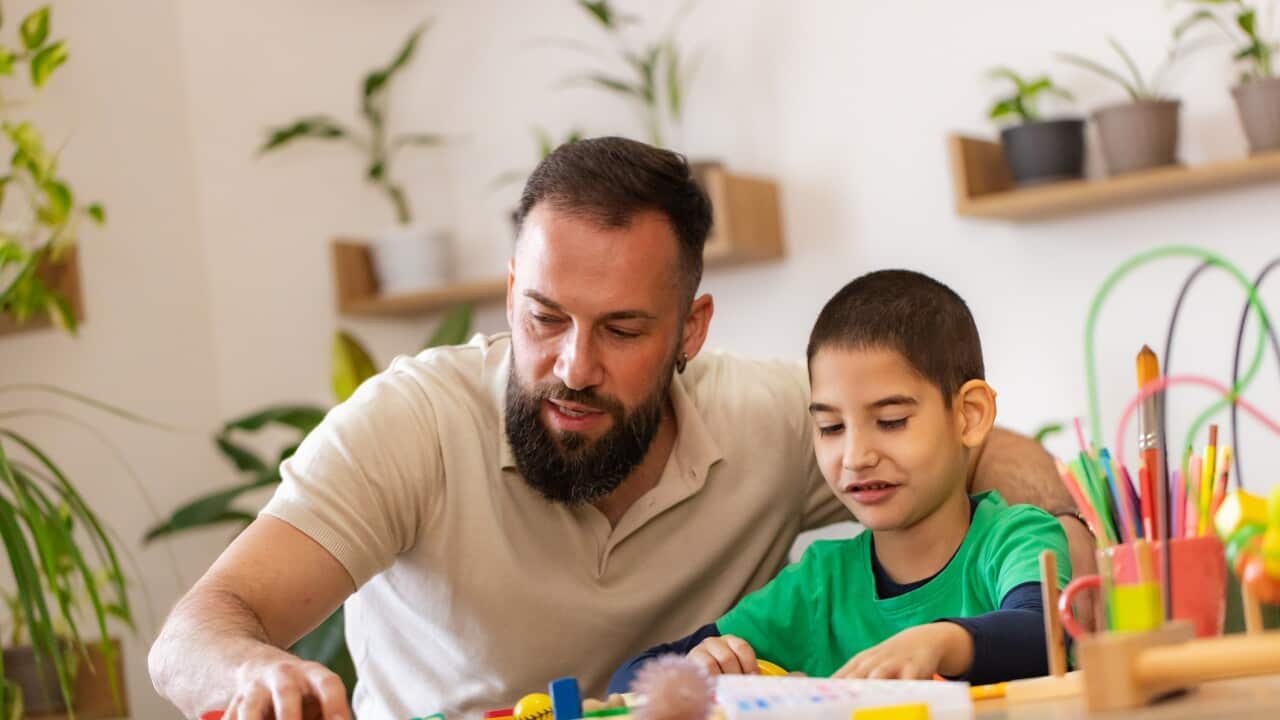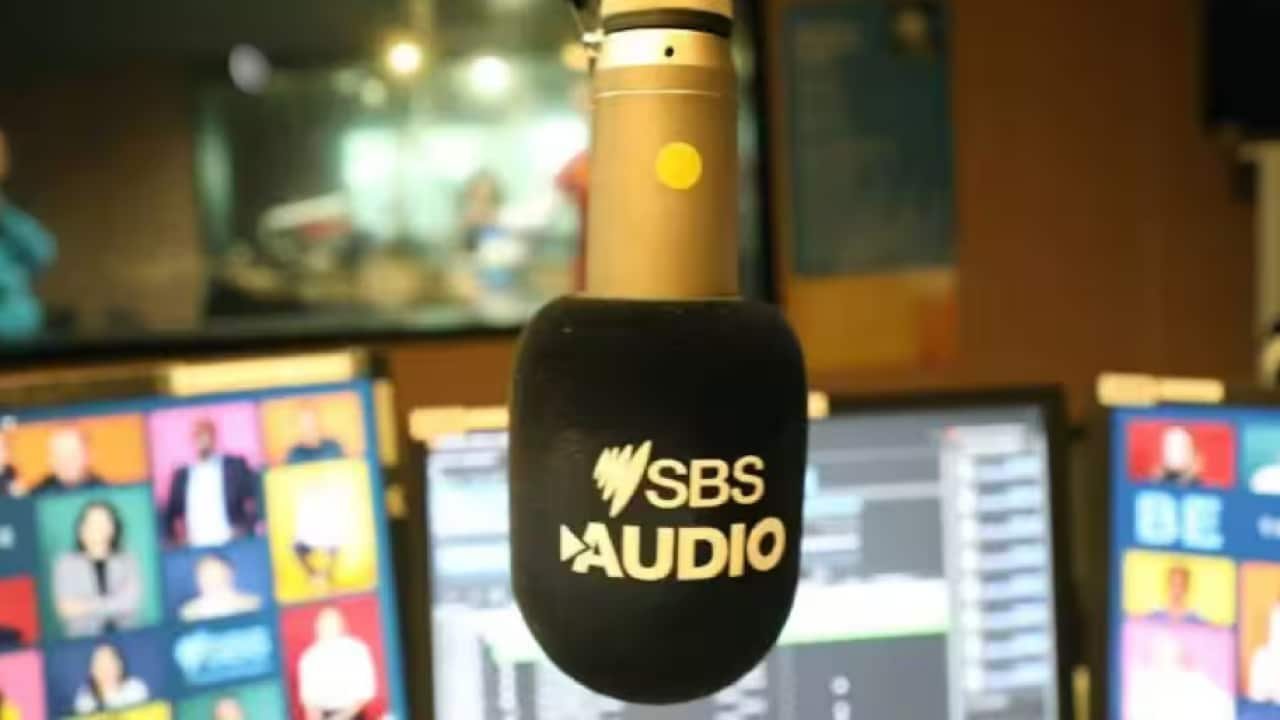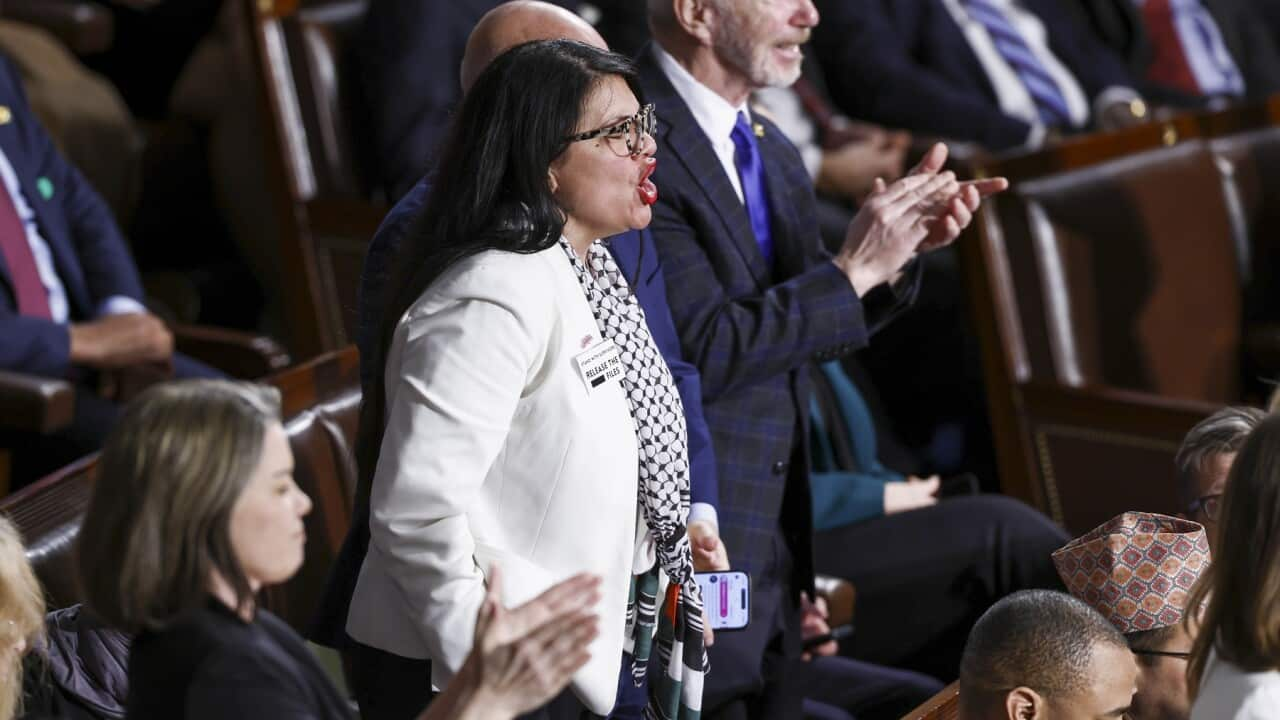My son has autism. Learning English helps me talk about them.
SBS acknowledges the traditional custodians of country and their connections and continuous care for the skies, lands and waterways throughout Australia.
Josipa
Last week, I was talking with a group of people about autism spectrum disorder. According to the Australian Bureau of Statistics, about 675,000 Australians are autistic, and most of them are young people, each with different strengths, interests, challenges, and aspirations.
Josipa
Hi, I'm Josipa, and during that chat, I learned some new phrases I'd like to share with you.
Josipa
Let's start by talking about what autism spectrum disorder is. Or actually, maybe it's better to start with what it isn't.
Josipa
It is not an illness.
Josipa
A disability is a physical or mental condition, which means that someone has difficulty doing some things in their life. Some people are born with a disability, while others develop them later.
Josipa
Autism spectrum is a disability that people are born with. People with autism can often think, feel, and see the world differently.
Josipa
The word spectrum means a range of things that are related to each other. Think of a rainbow. It has a lot of colours that slowly change from one to another. That's a spectrum.
Josipa
We talk about an autism spectrum because people with autism can have different experiences. Some find it easy to talk and make friends. Others find it hard. Some people don't like loud noises or bright lights. Others, others don't mind. So we use the term spectrum because autism isn't just one thing.
Josipa
But can affect people in a range of different ways. You might know someone on the autism spectrum, or maybe like me, you just want to understand it better and learn how to talk about it. If that sounds like you, let's learn together with the help of Allan and Claire.
Claire
How's your nephew going? You said he got diagnosed recently.
Allan
Yeah, last month. He's eight now. It's been a bit of a learning curve for all of us.
Claire
Did you notice anything before the diagnosis?
Allan
Sort of. He's really focused on trains, knows all the Sydney lines, but he struggles with noise and changes to his routine.
Claire
Is he getting support at school?
Allan
He's got a learning support teacher and he sees a speech therapist.
Claire
My brother's on the spectrum too, and support has made all the difference for him.
Josipa
I think it's always worth learning how to talk about conditions like autism in a caring and respectful way, because we all have our differences. So let's start. Claire first asked Alan,
Claire
How's your nephew going? You said he got diagnosed recently?
Josipa
Here Claire remembers that not long ago, Allan told her something important about his nephew.
Josipa
She knows that he got diagnosed, that is, that he and his parents had found out from the doctor what condition he has. So, now Claire is checking in to ask how he is doing now he has his diagnosis.
Josipa
A diagnosis is the result or opinion that a doctor gives after looking at someone's symptoms.
Allan
Yeah, last month. He's eight now. It's been a bit of a learning curve for all of us.
Josipa
We say that something has been a bit of a learning curve when we have to learn a lot of new things very quickly.
Josipa
We can use this phrase when we have faced something new or a bit difficult. For example, it was a bit of a learning curve for me when I had to learn to drive on the left side of the road. Claire then said,
Claire
Did you notice anything before the diagnosis?
Josipa
This is a way to ask what signs or symptoms people noticed which might have made them go to the doctor in the first place, but remember, questions about health can be personal. Claire could only ask Allan this because she knows him very well.
Josipa
Now, do you remember some of the symptoms Allan mentioned?
Allan
He's really focused on trains, knows all the Sydney lines, but he struggles with noise and changes to his routine.
Josipa
Alan's nephew is really focused on trains. To be focused on something means to pay a lot of attention to it or be very interested in it.
Josipa
People who can focus so much have a special skill, but it can also mean that they find it hard to think about other things.
Allan
But he struggles with noise and changes to his routine.
Josipa
To struggle with something means to find it difficult, and the routine is something you do regularly like waking up or eating dinner at the same time each day. Like many people with autism, Alan's nephew doesn't like noisy places and doesn't like changes to his daily routine.
Josipa
Some people with autism may struggle with making new friends or find it hard to join conversations. I wonder if this is the case with Alan's nephew. In that case, you might say,
Claire
He finds it hard to make new friends.
Allan
He needs extra help to understand social rules.
Josipa
Talking about extra help, Claire asked Allan if his nephew is getting support at school, and fortunately he is because Alan replied,
Allan
He's got a learning support teacher and he sees a speech therapist.
Josipa
It looks like Alan's nephew is getting a lot of support or extra help. A learning support teacher is a specially trained teacher who helps students who need extra support with their classroom learning. Speech therapists are trained to help people who have difficulty communicating, mainly talking. At the end of the dialogue, Claire said,
Claire
My brother's on the spectrum too, and support has made all the difference for him.
Josipa
If something has made all the difference, it means it has helped a lot and changed things for the better. For example, my new reading glasses have made all the difference to me. Now I can see clearly.
Josipa
Claire shared that her brother has also been diagnosed with autism spectrum disorder, but she used a more casual, less medical way of saying it.
Claire
My brother's on the spectrum too.
Josipa
There are different ways we can talk about someone with this condition. For example,
Allan
They are neurodivergent.
Josipa
Neurodivergent means someone's brain works in a different way from what's considered typical.
Josipa
This can include people with autism or other conditions that affect thinking, learning, or behaving.
Claire
They are autistic or
Allan
They are differently abled.
Josipa
If someone is differently abled, they are able to do many things, but they might do them in a different, non-typical way. As I get better at English, I realise that sometimes it actually gets harder to find the exact right word to say, because different people might like to be described in different ways. In that case, we can just ask them.
Josipa
Learning a language isn't just about words. It helps us understand and connect with others. So, let's listen to our dialogue again before we practice what we have learned today.
Claire
How's your nephew going? You said he got diagnosed recently.
Allan
Yeah, last month. He's eight now. It's been a bit of a learning curve for all of us.
Claire
Did you notice anything before the diagnosis?
Allan
Sort of. He's really focused on trains, knows all the Sydney lines, but he struggles with noise and changes to his routine.
Claire
Is he getting support at school?
Allan
He's got a learning support teacher and he sees a speech therapist.
Claire
My brother's on the spectrum too, and support has made all the difference for him.
Josipa
You're about to meet Minette Sales, a mother of twin boys who were both diagnosed with autism.
Josipa
Let me bring her into the conversation.
Minette
Um, I'm pretty good, um, as what I've said to you, um, you know, um, with my boys, so yeah, they're a bit better today, but yeah, um, today is a great day.
Josipa
So can you please tell me, do you remember the day your boys were diagnosed with autism?
Minette
Um, yes, I, I remember that day very clearly. Um, it was, it was back in 2017. They were two-years old when they were diagnosed cause my boys were premature when they were born, so they were born at 28 weeks. So hearing the words, um, you know,
Minette
Your boys are on the spectrum at that exact moment when, when the paediatrician told me, you know, that your boys, your twins are on the spectrum was very overwhelming for me. Um, I felt a lot um a whole mix of emotions like, you know, fear of the unknown, um, sadness because the future I have, you know, pictured for them.
Minette
Suddenly look different, you know, and then, but the relief that at least now we had, you know, when, when they were diagnosed, have, you know, the, um, at least we had some answers to all the questions I had at that time, you know, with all the behaviours that they were showing at that time.
Minette
Um, when I had the, the when they had the diagnosis, obviously some of the, you know, some of the questions were answered. Um, I didn't fully understand what the, the challenges were ahead at that time, but as the years went on
Minette
I learned that while there are difficulties, there are also, you know, so much joy that my boys have, you know, taught me about patience, resilience, and how to see the world through a completely different lens.
Josipa
That's beautiful. I have to be honest, when it comes to sensitive topics like autism, one of my biggest concern is saying something the wrong way and maybe unintentionally causing offense.
Josipa
Yeah, so from your perspective, what's the respectful and appropriate way to talk about a disability like autism?
Minette
Yeah, so there's a lot of, you know, arguments, um, you know, arguments, debates regarding, you know, what are the correct terms and how we can address a person with autism. So when it comes to talking about autism, obviously language really matters more than people often realise. So the words we we use don't just describe.
Minette
Uh, they actually shape how others see my children or our children and even how my children see themselves. So that's why sensitivity is very important when it comes to talking about, you know, autism.
Minette
Um, for me, this is personally, there are two common approaches, um, when it comes to, you know, the language that we use or the proper language that we use when we are addressing about autism or people with, with autism. So first one is person first language, like saying a child with autism because this one, it emphasizes that the child is a person first before the diagnosis.
Minette
Mhm. Um, and then the second one is identity first language, like saying an autistic child. Um, with this one, with this approach, it highlights that a um, autism is an integral part of who they are and not something separate from them.
Minette
Um, both are used and different families or individuals have different preferences. So for me personally, uh, you, I usually say my boys or my twin boys are on the autism spectrum. For me that feels respectful and true to who they are. So yeah, so like for example, um, what I would avoid, um, terms that sound negative, outdating and um pitying.
Minette
So words like um suffering from autism, afflicted with autism, or describing it as a disease or a disorder that needs to be fixed. It can be very hurtful, um, because, you know, autism is not something to be cured. It's a different way of experiencing the world. Um, like for my boys, they don't suffer from autism, they live with it, they grow with it, and it's part of their identity.
Josipa
Talking about things that are not appropriate, are there any questions that you feel that are not appropriate to ask uh about autism?
Minette
Mm. So yeah, um, definitely, this is, uh, coming from my mom, uh, a mom of, um, you know, two kids with, um, autism. Um, definitely questions that come from assumptions or focused on the limitations can be very hurtful. Things like, you know, will they ever be normal, you know, or what caused their autism? Those, those questions for me, again, as a mom.
Minette
Those carry judgment and don't, don't acknowledge them as an individual. That's, that's just for me but of course, yeah, but what really, what we really appreciate, um, as a mom or you know, family with, with kids with um autism.
Minette
Are questions that come from a genuine curiosity and care. For example, how do your boys, uh, how do your boys like to communicate? uh, what helps them feel comfortable? Uh, those kinds of questions open doors to understanding and support because at the end of the day what families like mine need isn't labels or pity.
Minette
It's kindness, um, respect, and an open heart. That's what makes us feel truly seen and supported.
Josipa
You said it so beautifully, Minette. Thank you so much for your time and for sharing your story with us.
Minette
Thank you, Josipa, it's a pleasure.
Josipa
It's time to practice. See if you remember the meaning before hearing the answer. What is a diagnosis?
Allan
A diagnosis is the result or opinion a doctor gives after examining someone's symptoms.
Josipa
If something has made all the difference, it means...?
Claire
If something has made all the difference, it means it has helped a lot and changed things for the better.
Josipa
Now you can practice speaking by repeating after Alan and Claire.
Allan
They are neurodivergent.
Claire
My brother's on the spectrum.
Allan
My nephew got diagnosed with autism spectrum.
Claire
My brother's on the spectrum.
Josipa
On our website and socials, Facebook, Instagram, and YouTube, you'll find more tips and learning resources. Just search for SBS Learn English. I'm Josipa. Thank you for learning English with me today.






